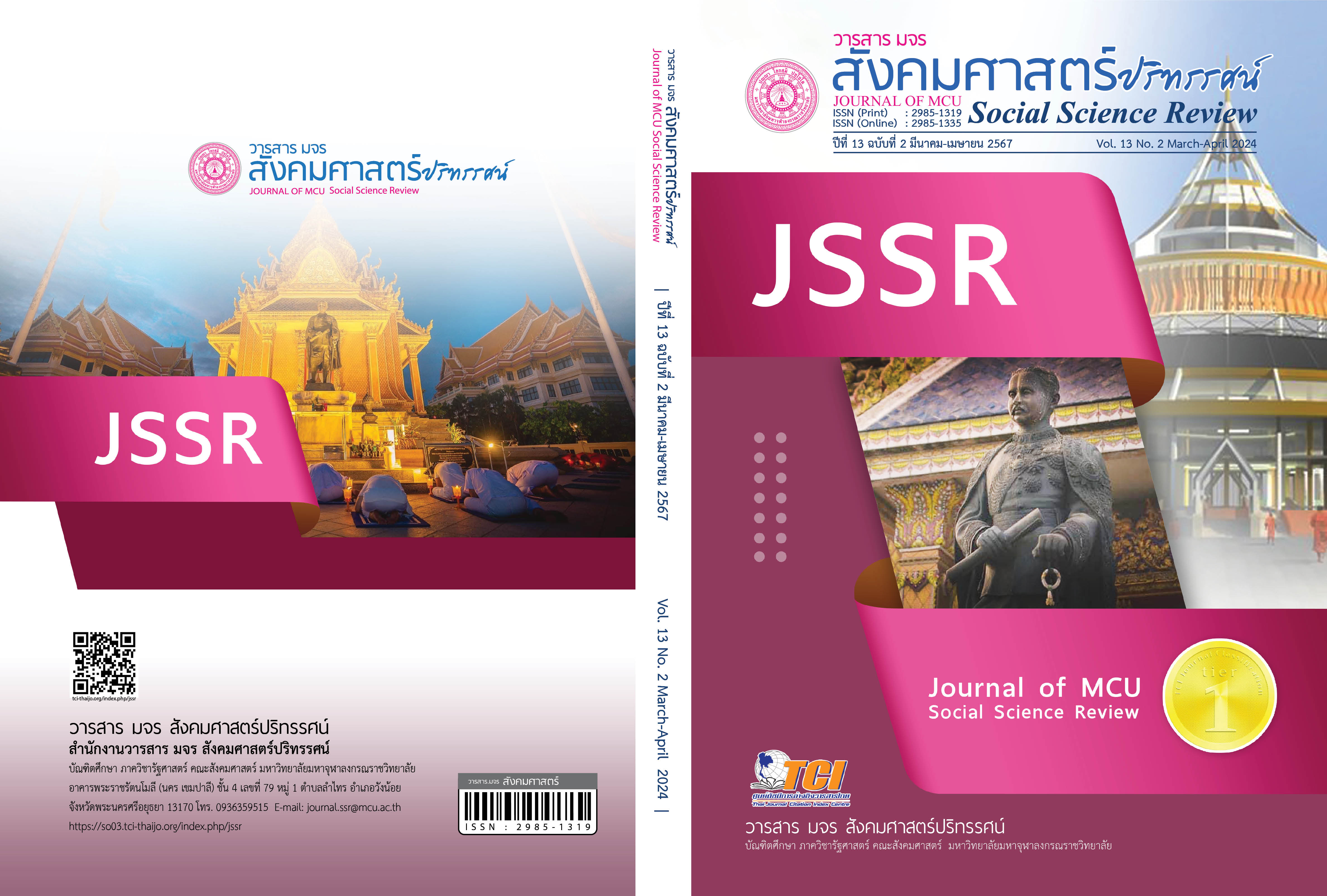การเพิ่มขึ้นของความไม่เท่าเทียมและการฟื้นฟูสำหรับความเปลี่ยนแปลงทางเศรษฐกิจภายหลังยุค COVID-19
คำสำคัญ:
ความไม่เท่าเทียม, การฟื้นฟูทางเศรษฐกิจ, ความกังวลด้านสิ่งแวดล้อม, อัตราการว่างงานบทคัดย่อ
วิกฤตการณ์การระบาดของ COVID-19 ได้ก่อให้เกิดผลกระทบอย่างรุนแรงต่อสังคม จำนวนผู้เสียชีวิตทั้งหมดนั้นเกินกว่า 3.1 ล้านคนและยังคงเพิ่มขึ้นอย่างต่อเนื่อง ผู้คนมากกว่า 120 ล้านคนต้องประสบกับภาวะยากจนอย่างหนัก เกิดภาวะเศรษฐกิจถดถอยอย่างรุนแรงทั่วโลก จำนวนของผู้ที่ประสบความยากลำบากจากทุพภิกขภัยเพิ่มมากขึ้น อีกทั้งความสามารถในการฟื้นฟูตลาดเกิดใหม่และเศรษฐกิจเกิดใหม่นั้นก็เป็นที่น่าวิตก ในขณะที่ผลกระทบจากความเปลี่ยนแปลงของภูมิอากาศ การปล่อยคาร์บอน การทำลายถิ่นที่อยู่ และความเสื่อมโทรมของมหาสมุทรนั้นยังคงสร้างความลำบากไปทั่วโลก และยังแสดงให้เห็นความเปราะบางในเชิงระบบของเศรษฐกิจโลกที่ท้ายที่สุดแล้วอาจนำไปสู่วิกฤติที่ร้ายแรงกว่าในปัจจุบัน ถึงแม้ว่าจะมีดัชนีชี้วัดต่างๆในเชิงบวกจากทั้งภาครัฐบาล ภาคเอกชน และตัวบุคคล แต่การฟื้นฟูนั้นยังจำเป็นต้องกระทำอย่างเข้มข้น รัฐบาลในหลายประเทศนั้นได้ตระหนักถึงความจำเป็นและโอกาสของการฟื้นฟูอย่างยั่งยืน บทความนี้ได้ทบทวนวรรณกรรมในเรื่องความไม่เท่าเทียม การฟื้นฟูเศรษฐกิจ ความกังวลด้านสิ่งแวดล้อม ตลาดแรงงาน การกระจายแรงงาน และรัฐสวัสดิการ อีกทั้งความเสี่ยงต่อการว่างงาน
เอกสารอ้างอิง
Alon, T., et al. (2022). From mancession to shecession: Women’s employment in regular and pandemic recessions. NBER Macroeconomics Annual, 36(1), 83–151.
Ashford, N. A., et al. (2020). Addressing inequality: The first step beyond COVID-19 and towards sustainability. Sustainability, 12(13), 5404-5430.
Atkins, R., et al. (2022). Discrimination in lending? Evidence from the Paycheck Protection Program. Small Business Economics, 58(2), 843–865.
Bapuji, H., et al. (2020). Corona crisis and inequality: Why management research needs a societal turn. Journal of Management, 46(7), 1205–1222.
Bluedorn, M. J. C., et al. (2021). Gender and Employment in the COVID-19 Recession: Evidence on She-cessions. International Monetary Fund.
Crary, A. & Gruen, L. (2022). Animal crisis: A new critical theory. John Wiley & Sons.
Danet, A. D. (2021). Psychological impact of COVID-19 pandemic in Western frontline healthcare professionals: A systematic review. Medicina Clínica (English Edition), 156(9), 449–458.
Ebbinghaus, B., et al. (2022). Welfare state support during the COVID‐19 pandemic: Change and continuity in public attitudes towards social policies in Germany. European Policy Analysis, 8(3), 297–311.
Faberman, R. J., et al. (2022). Has the willingness to work fallen during the Covid pandemic?. Labour Economics, 79, 1-50.
Fairlie, R. (2020). The impact of COVID‐19 on small business owners: Evidence from the first three months after widespread social distancing restrictions. Journal of Economics & Management Strategy, 29(4), 727–740.
Gneiting, U., et al. (2021). Power, profits and the pandemic: From corporate extraction for the few to an economy that works for all. Retrieved March 20, 2022, from https://shorturl.asia/bAWfF
Gomez-Salvador, R., & Soudan, M. (2022). The US labour market after the COVID-19 recession. Retrieved March 20, 2022, from https://shorturl.asia/2MtDm
Hershbein, B., & Holzer, H. J. (2021). The COVID-19 pandemic’s evolving impacts on the labor market: Who’s been hurt and what we should do. SSRN. Retrieved March 20, 2022, from https://shorturl.asia/5GgO0
International Labour Organization. (2020). ILO: As job losses escalate, nearly half of global workforce at risk of losing livelihoods. International Labour Organization.
Milovanska, F. S. (2021). The Effect of a Health and Economic Shock on the Gender, Ethnic and Racial Gap in Labor Market Outcomes: Evidence from COVID-19. Retrieved March 20, 2022, from https://shorturl.asia/71nxi
Morgan, R., et al. (2022). Women healthcare workers’ experiences during COVID-19 and other crises: A scoping review. International Journal of Nursing Studies Advances, 4, 1-20.
Parker, K., et al. (2020). Economic fallout from COVID-19 continues to hit lower-income Americans the hardest. Policy Commons. Retrieved March 20, 2022, from https://shorturl.asia/VDp2E
Piacentini, J., et al. (2022). The Impact of COVID-19 on labor markets and inequality. Retrieved March 20, 2022, from https://shorturl.asia/9ab3M
Shierholz, H., et al. (2022). Latest data release on unionization is a wake-up call to lawmakers. Economic Policy Institute. Retrieved March 20, 2022, from https://shorturl.asia/yGTCU
Tranjan, R., & Block, S. (2020). Rebuilding our public services. Retrieved March 20, 2022, from https://shorturl.asia/lRfnA
Tüzemen, D. (2021). Women without a college degree, especially minority mothers, face a steeper road to recovery. Economic Review, 6(3), 5-23.
U.S. Bureau of labor statistics. (2022). U.S. Labor Statistics. retrieved from https://www.bls.gov/opub/mlr/2022/home.htm
Wang, Q., & Wang, S. (2020). Preventing carbon emission retaliatory rebound post-COVID-19 requires expanding free trade and improving energy efficiency. Science of The Total Environment, 746, 141-158.
ดาวน์โหลด
เผยแพร่แล้ว
รูปแบบการอ้างอิง
ฉบับ
ประเภทบทความ
สัญญาอนุญาต
ลิขสิทธิ์ (c) 2024 วารสาร มจร สังคมศาสตร์ปริทรรศน์

อนุญาตภายใต้เงื่อนไข Creative Commons Attribution-NonCommercial-NoDerivatives 4.0 International License.
เพื่อให้เป็นไปตามกฎหมายลิขสิทธิ์ ผู้นิพนธ์ทุกท่านต้องลงลายมือชื่อในแบบฟอร์มใบมอบลิขสิทธิ์บทความให้แก่วารสารฯ พร้อมกับบทความต้นฉบับที่ได้แก้ไขครั้งสุดท้าย นอกจากนี้ ผู้นิพนธ์ทุกท่านต้องยืนยันว่าบทความต้นฉบับที่ส่งมาตีพิมพ์นั้น ได้ส่งมาตีพิมพ์เฉพาะในวารสาร มจร สังคมศาสตร์ปริทรรศน์ เพียงแห่งเดียวเท่านั้น หากมีการใช้ภาพหรือตารางหรือเนื้อหาอื่นๆ ของผู้นิพนธ์อื่นที่ปรากฏในสิ่งตีพิมพ์อื่นมาแล้ว ผู้นิพนธ์ต้องขออนุญาตเจ้าของลิขสิทธิ์ก่อน พร้อมทั้งแสดงหนังสือที่ได้รับการยินยอมต่อบรรณาธิการ ก่อนที่บทความจะได้รับการตีพิมพ์ หากไม่เป็นไปตามข้อกำหนดเบื้องต้น ทางวารสารจะถอดบทความของท่านออกโดยไม่มีข้อยกเว้นใดๆ ทั้งสิ้น





